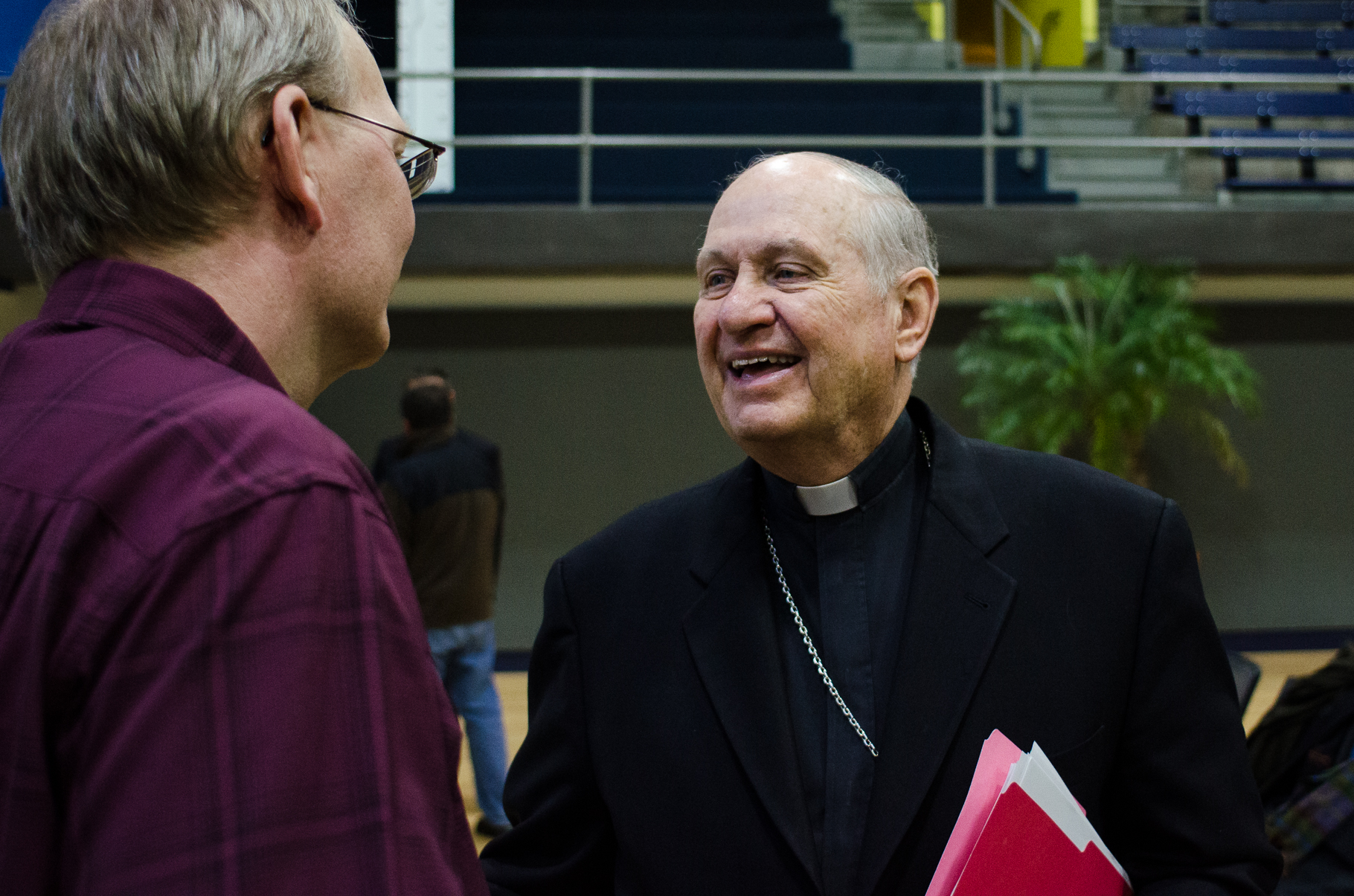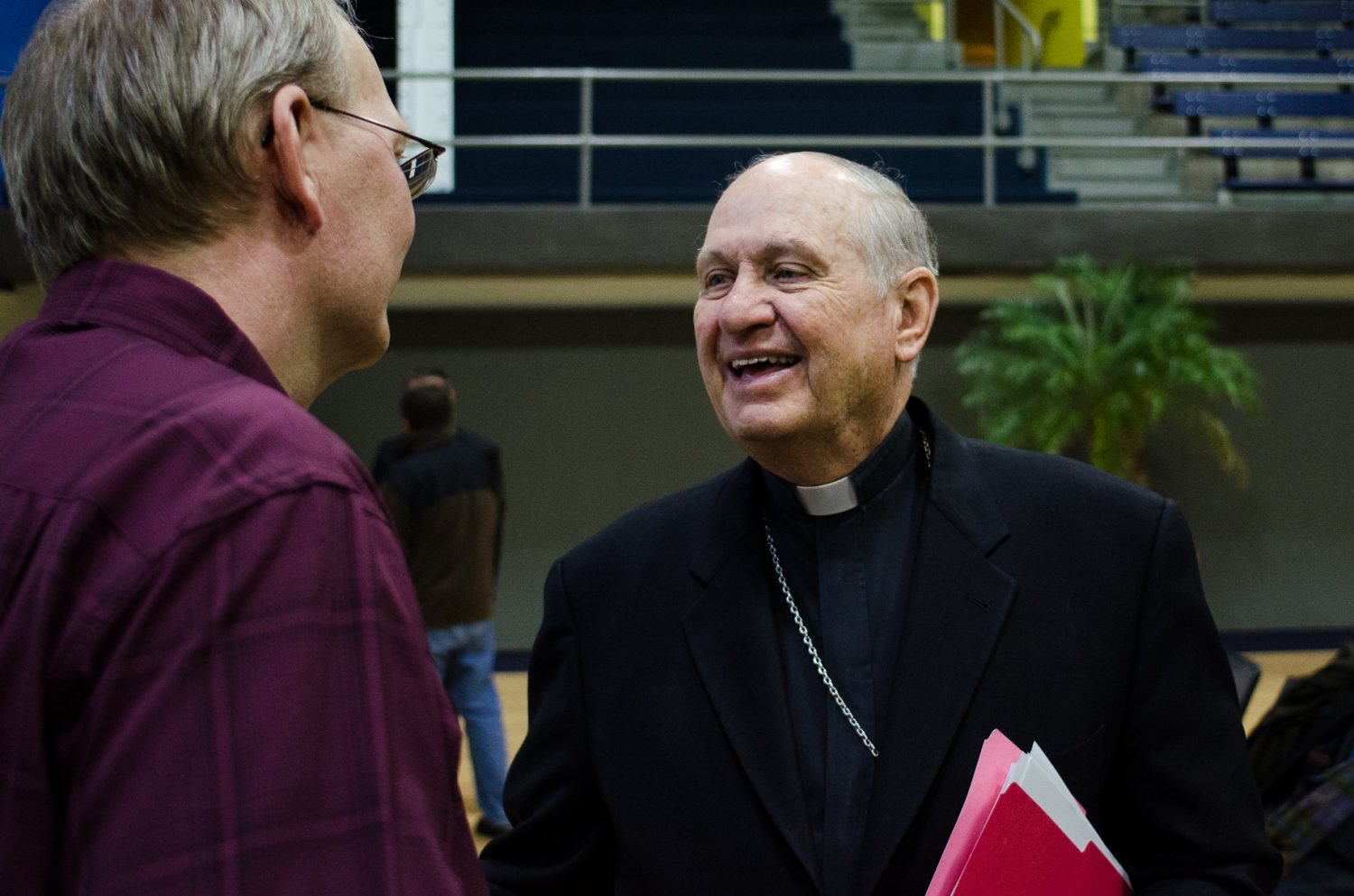
For three years, Bishop Richard Pates served as the chairman of the Committee on International Justice and Peace for the United States Conference of Catholic Bishops, and on Thursday, Jan. 29, Pates – currently the bishop of Des Moines, Iowa – came to the CGC to join SLU’s Catholic Studies program in a discussion about the Catholic and American response to global peace issues. As chairman of the Committee on International Peace and Justice, Pates brought a wealth of experience to the discussion. On behalf of the Catholic Church in the United States, he has traveled extensively and has experience the struggle for peace in some of the world’s most dangerous areas. And he feels that the Church has a lot to offer in terms of building world peace.
“We must not fear or be hesitant to let that faith [Catholicism] be a vehicle of influence,” Pates said to the audience. “The Church teaches that peace can only be built on the firm foundation of justice. The Church seeks at creating the authentic culture of peace in which the defense and protections of human rights is essential for the building up of a peaceful society.”
In addressing the idea that peace can only be built by achieving justice, Pates took the audience what he called “a world tour of peace and justice issues.” His talk encompassed three areas where he says that achieving peace is the most pressing issue: Israel/Palestine, Afghanistan/Pakistan, and Latin America. People in these areas, he said, are stuck in cycles of violence that breed conflict and stifle peace-building efforts.
In his remarks on the Israel-Palestine relationship, Pates noted that while the geographical area that these two entities encompass is the Holy Land – the spiritual center for billions of people worldwide – “Tragically, it is also a land where people have known violence for decades and yearn for a joining peace…concrete negotiations have been frustrating, as each party seems to set conditions that the other is unwilling to meet. These past two years have been particularly difficult for those on both sides seeking a lasting peace,” he said.
Highlighting the difficulties in creating lasting peace between Israel and Palestine, Pates asserted that while Israel has a right to defend itself, its military responses have often been disproportionate and dangerous to civilians.
“In the wake of the latest Gaza war,” he said, “I visited the Holy Family Catholic Church in Gaza, in September, on a U.S. Bishop’s pilgrimage for peace. The destruction…was devastating to see. Hundreds of innocent civilians lost their lives.”
But internal Palestinian tensions and conflict also cause damage to the struggle for peace, Pates iterated.
“In different ways, the actions of both Hamas and Israel increase the misery and tensions that breed violence and impede the creation of a viable Palestine and a secure Israel,” he said.
“Both Israelis and Palestinians as people, have dreams similar to ours,” he added. “Both are trapped in a cycle of violence and isolation that makes peace and reconciliation distant hopes.”
But the U.S. Conference of Catholic Bishops, Pates said, is seeking to build peace in this area.
“In Washington, the United States Conference of Catholic Bishops works for a just peace that curbs violence, provides recognition and security for Israel…and establishes an internationally recognized, and viable, Palestinian state,” he said.
Pates’ discussion of Afghanistan and Pakistan centered on the U.S. involvement in the area following the 9/11 attacks, but he highlighted the military nature of this prolonged interaction; $686 billion have been spent since 2001 for combat operations, with only $13 billion for aid over the same period. But Pates said that the Conference of Catholic Bishops has continued to offer “pastoral messages” to the U.S. government concerning its war on terrorism – notably to use restraint with military forces and to address – and alleviate – the root causes of terrorism.
Pates’ presentation also briefly touched on Latin America and issues of justice surrounding immigration policy in the U.S. People in Latin American countries, Pates said, are often faced with a difficult choice: stay where there is rampant crime and corruption, or risk the journey to the United States.
And, “tragically,” he said, “even of those fortunate to reach the U.S., the journey often ends with imprisonment and deportation at the hands of our country’s criminal justice and immigration system.”
Pates called for a re-evaluation of the immigration system in the United States so that it better addresses the needs of people desperate to restart their lives in a safe place. And he called for the United States – and American Catholics – to heed the call to serve the poor and work for peace and justice.
“We, living in the wealthiest country in history, basically ignore the people to the south. While a washed in abundance, we are unresponsive to the poverty at our doorstep,” he said. “Can we, American Catholics, be a poor church for the poor?”






